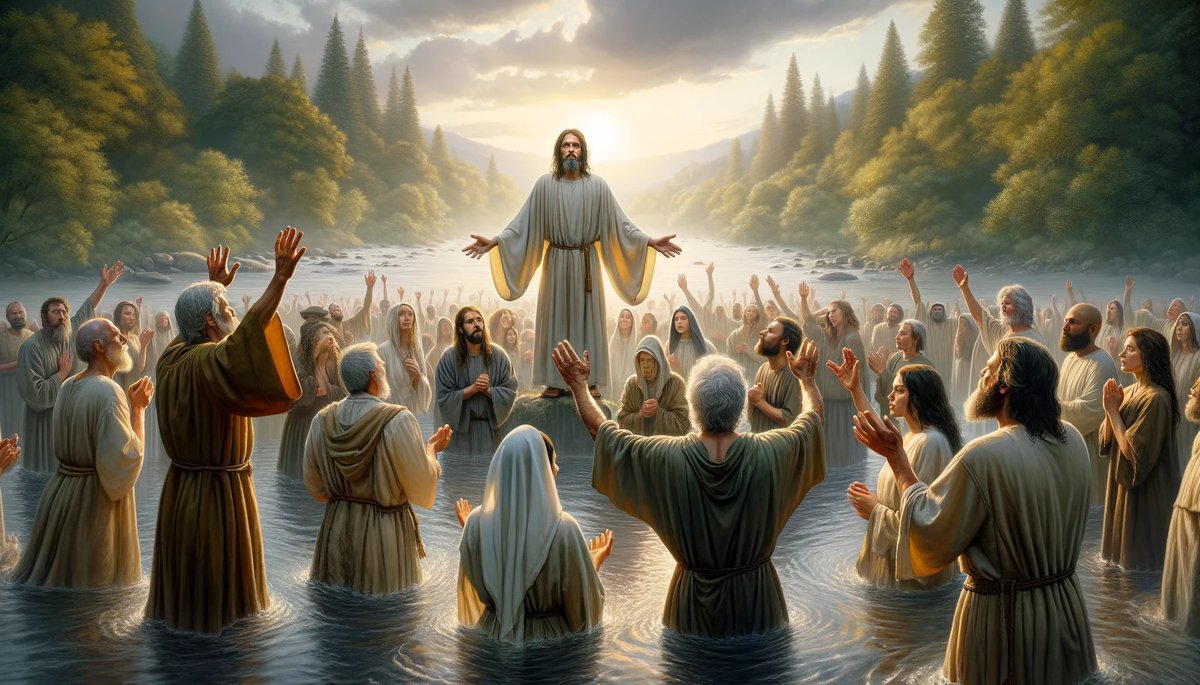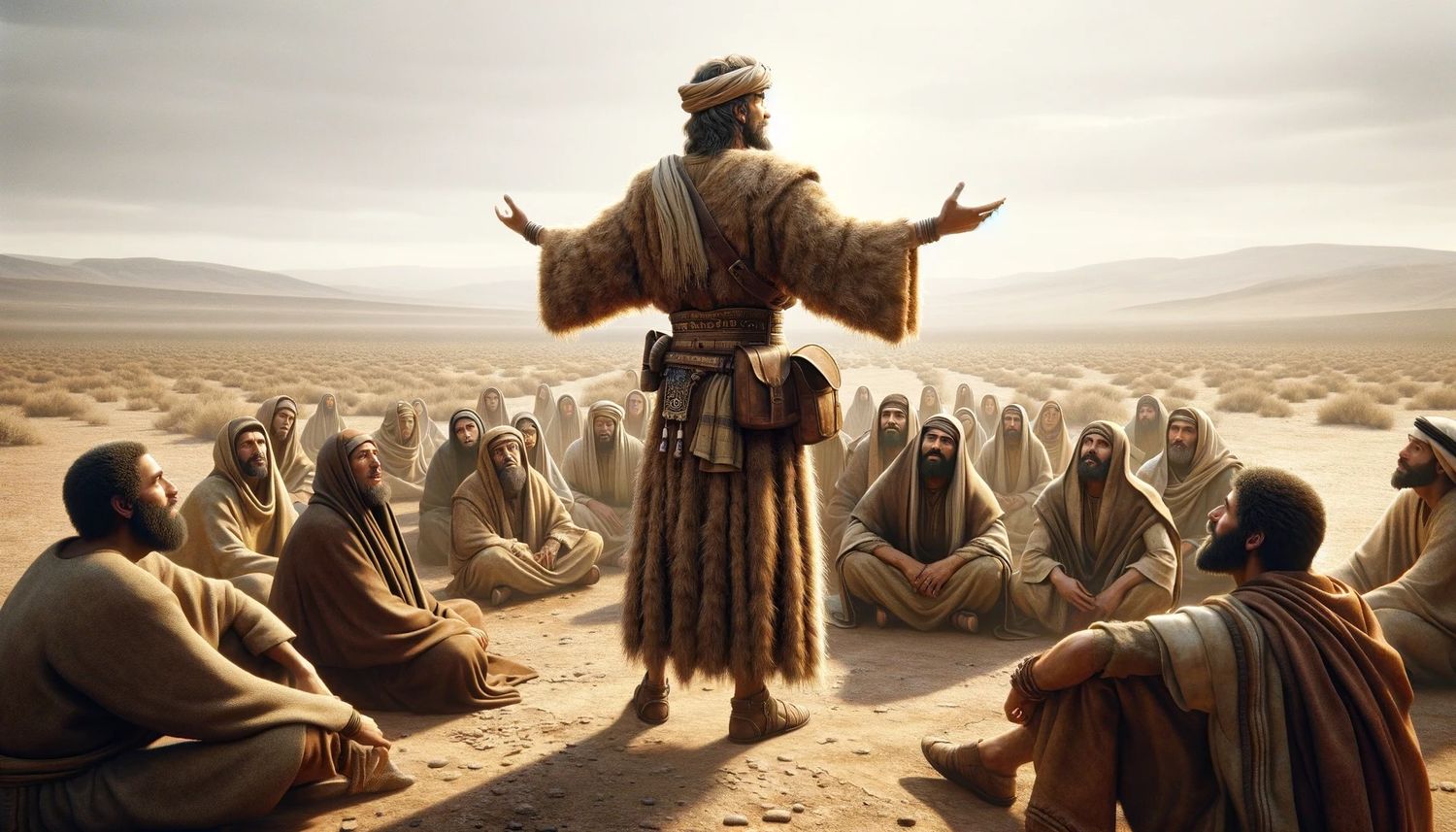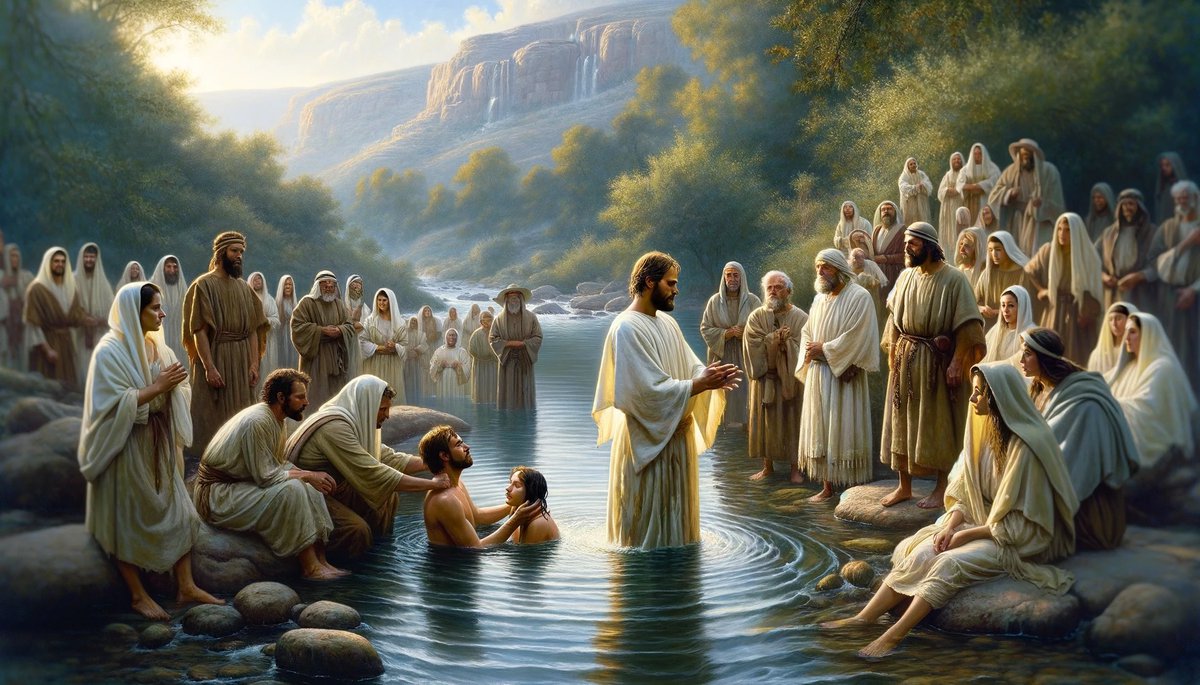Home>Theology and Spirituality>What Can We Learn From The Life Of John The Baptist


Theology and Spirituality
What Can We Learn From The Life Of John The Baptist
Published: February 24, 2024
Jason DeRose, Managing Editor at Christian.net, uses his expertise in religion and journalism to deepen understanding of faith's societal impacts. His editorial leadership, coupled with a strong academic background, enriches the platform’s diverse content, earning him recognition in both journalism and religious circles.
Discover valuable lessons from the life of John the Baptist and deepen your understanding of theology and spirituality. Explore his teachings and impact today.
(Many of the links in this article redirect to a specific reviewed product. Your purchase of these products through affiliate links helps to generate commission for Christian.net, at no extra cost. Learn more)
Table of Contents
Introduction
The life of John the Baptist is a compelling narrative that continues to captivate and inspire individuals across generations. His story is deeply intertwined with the religious landscape of his time and holds valuable lessons that resonate with people of diverse faiths and backgrounds. As we delve into the intricacies of John the Baptist's life, we uncover profound insights that transcend the boundaries of time and culture.
John the Baptist, often depicted as a rugged figure preaching in the wilderness, is a central figure in Christianity, revered for his unwavering commitment to his beliefs and his pivotal role in preparing the way for the ministry of Jesus Christ. His significance extends beyond religious contexts, as his life exemplifies courage, conviction, and a profound sense of purpose.
Exploring the life of John the Baptist offers a glimpse into a tumultuous era marked by spiritual fervor and societal upheaval. His emergence as a prominent voice in the Judean wilderness during the 1st century CE coincided with a period of anticipation and longing for a transformative figure who would herald a new era of spiritual awakening.
As we embark on this journey through the life of John the Baptist, we are invited to contemplate the timeless themes of faith, sacrifice, and the pursuit of truth. His story serves as a poignant reminder of the enduring power of conviction and the profound impact of individuals who fearlessly challenge the status quo in pursuit of a greater purpose.
In the subsequent sections, we will delve into the early life and background of John the Baptist, unravel the essence of his ministry and message, explore his profound relationship with Jesus, reflect on his imprisonment and eventual death, and glean invaluable insights from his enduring legacy. Through this exploration, we will uncover the enduring relevance of John the Baptist's life and the profound lessons it offers to contemporary seekers of truth and spiritual enlightenment.
Read more: What Can We Learn From John The Baptist
Early Life and Background
John the Baptist's early life and background are shrouded in a sense of divine purpose and providence. According to the Gospel accounts, John was born to elderly parents, Zechariah and Elizabeth, who had longed for a child but had remained childless. His miraculous conception was foretold by an angel, signaling his destined role as a herald of great significance.
Raised in the hill country of Judea, John's upbringing was marked by a profound sense of spiritual calling. His devout parents instilled in him a deep reverence for God and a commitment to the principles of righteousness and moral integrity. As he matured, John gravitated towards a life of asceticism, choosing to dwell in the wilderness and embrace a lifestyle characterized by simplicity and spiritual discipline.
The wilderness became a formative backdrop for John's spiritual development, providing him with solitude and introspection as he sought to discern his purpose. His attire of camel's hair and diet of locusts and wild honey symbolized his detachment from material comforts and his unwavering focus on spiritual pursuits.
John's immersion in the wilderness was not merely a retreat from society but a deliberate embrace of solitude to commune with the divine and prepare himself for the profound mission that lay ahead. His ascetic lifestyle and fervent devotion to God set the stage for his emergence as a prophetic voice, calling people to repentance and spiritual renewal.
The backdrop of John's early life and upbringing underscores the profound intertwining of human agency and divine intervention. His birth, marked by divine providence, and his formative years in the wilderness exemplify the intricate interplay between individual calling and spiritual preparation. These foundational elements laid the groundwork for John's pivotal role as a prophetic figure, heralding a message of repentance and preparing the hearts of the people for the imminent arrival of the Messiah.
John the Baptist's early life and background serve as a testament to the transformative power of divine purpose and the profound impact of a nurturing environment steeped in faith and reverence. His journey from the hills of Judea to the wilderness encapsulates the timeless themes of spiritual discernment, solitude, and the formative influence of upbringing, all of which shaped his identity as a prophetic voice and a harbinger of profound spiritual transformation.
Ministry and Message
The ministry of John the Baptist unfolded against the backdrop of a society grappling with spiritual complacency and moral ambiguity. Emerging from the wilderness with an unyielding zeal, John embarked on a transformative mission that reverberated across the Judean landscape. His message, rooted in the prophetic tradition of calling people to repentance and spiritual renewal, resonated with a sense of urgency and unwavering conviction.
Central to John's ministry was the proclamation of a baptism of repentance for the forgiveness of sins. This symbolic act of immersion in the waters of the Jordan River signified a profound commitment to turning away from transgressions and embracing a renewed spiritual path. The act of baptism served as a powerful symbol of cleansing and spiritual rebirth, inviting individuals to undergo a transformative inner journey.
John's message transcended mere ritualistic observance, emphasizing the transformative power of genuine repentance and the alignment of one's heart and actions with the principles of righteousness and moral integrity. His impassioned calls for repentance were underscored by a profound sense of compassion and a fervent desire for the spiritual restoration of the people.
In addition to his emphasis on repentance, John fearlessly confronted the religious authorities and challenged the prevailing moral and ethical complacency. His uncompromising stance against hypocrisy and moral decadence reflected a deep commitment to upholding the principles of justice and righteousness. His bold rebukes and unwavering integrity positioned him as a prophetic voice unafraid to confront the societal ills of his time.
Moreover, John's ministry was marked by a profound anticipation of the imminent arrival of the Messiah. He fervently proclaimed the coming of one mightier than himself, whose sandals he was unworthy to untie. This anticipation of the Messiah's arrival infused John's ministry with a sense of profound expectation and hope, igniting the hearts of the people with the promise of a transformative figure who would usher in a new era of spiritual fulfillment.
The ministry of John the Baptist stands as a testament to the enduring power of prophetic voices and the timeless relevance of calls for repentance and spiritual renewal. His unwavering commitment to his message, coupled with his fearless confrontation of societal injustices, embodies the essence of prophetic integrity and moral courage. Through his ministry, John ignited a spiritual awakening that transcended the confines of his era, leaving an indelible legacy of transformative impact and unwavering devotion to the pursuit of spiritual truth.
Relationship with Jesus
The relationship between John the Baptist and Jesus Christ is a profound and pivotal aspect of their intertwined narratives. As cousins, their connection transcended familial ties, embodying a deeper spiritual significance that reverberated throughout the annals of religious history. The encounter between John and Jesus marked a transformative juncture, heralding the convergence of their respective ministries and the profound affirmation of divine purpose.
John the Baptist, in his role as the herald of the Messiah, played a pivotal part in preparing the hearts of the people for the arrival of Jesus. His ministry of baptizing for repentance served as a prelude to the transformative message and redemptive mission that Jesus would later impart. The baptism of Jesus by John in the waters of the Jordan River symbolized a profound moment of spiritual consecration, signifying the initiation of Jesus' public ministry and the divine affirmation of his role as the long-awaited Messiah.
Furthermore, John's recognition of Jesus as the Lamb of God, who takes away the sins of the world, underscores the depth of his spiritual insight and prophetic discernment. His unequivocal declaration of Jesus' divine identity illuminated the path for countless individuals to recognize and embrace the transformative message and salvific mission embodied by Jesus.
The relationship between John the Baptist and Jesus transcended mere historical proximity; it epitomized a profound spiritual synergy that resonated with the overarching narrative of redemption and spiritual fulfillment. John's unwavering commitment to preparing the way for Jesus and his resolute acknowledgment of Jesus' divine purpose exemplify the profound interconnectedness of their missions and the timeless significance of their collective impact on humanity's spiritual trajectory.
The encounter between John and Jesus serves as a poignant testament to the intricate tapestry of divine providence and human agency. Their relationship embodies a profound interplay of spiritual calling, prophetic fulfillment, and the enduring resonance of their collective mission. Through their interconnected narratives, John the Baptist and Jesus Christ illuminate the transformative power of spiritual kinship and the profound impact of individuals who wholeheartedly embrace their divine purpose.
The relationship between John the Baptist and Jesus Christ stands as a testament to the enduring power of spiritual synergy and the profound impact of individuals who wholeheartedly embrace their divine purpose. Their interconnected narratives illuminate the transformative power of spiritual kinship and the profound impact of individuals who wholeheartedly embrace their divine purpose.
Imprisonment and Death
The narrative of John the Baptist's life takes a poignant turn as he confronts the harrowing ordeal of imprisonment and ultimately faces a tragic demise. His unwavering commitment to truth and righteousness becomes starkly evident as he becomes embroiled in a tumultuous sequence of events that culminate in his unjust incarceration and eventual martyrdom.
John's imprisonment unfolds against the backdrop of his unyielding stance against moral transgressions, including his vocal condemnation of the illicit union between Herod Antipas, the tetrarch of Galilee, and Herodias, his brother's wife. His fearless denunciation of this union, which contravened Jewish law and moral principles, incurred the wrath of Herodias, who harbored deep animosity towards John. Herod Antipas, swayed by Herodias' daughter's request during a banquet, reluctantly ordered the imprisonment of John the Baptist.
The confines of the prison, while physically restrictive, failed to diminish the fervor of John's spirit. Despite the oppressive circumstances, John remained resolute in his commitment to truth and righteousness. His unwavering faith and unyielding integrity continued to shine brightly, inspiring those who were privy to his steadfast resolve.
Tragically, John's imprisonment culminated in a fateful turn of events that led to his untimely death. Herodias, fueled by vindictive motives, seized the opportune moment during Herod's birthday celebration to orchestrate a sinister plot against John. Prompted by her daughter's dance, Herod rashly vowed to grant her any request, which ultimately led to the tragic beheading of John the Baptist.
The martyrdom of John the Baptist stands as a testament to the profound cost of unwavering commitment to truth and righteousness. His unjust imprisonment and tragic demise underscore the inherent challenges and sacrifices that accompany the uncompromising pursuit of moral integrity and prophetic conviction. Despite the grim circumstances surrounding his death, John's enduring legacy continues to inspire countless individuals, serving as a poignant reminder of the indelible impact of unwavering faith and unyielding dedication to the pursuit of spiritual truth.
The narrative of John the Baptist's imprisonment and death serves as a poignant reminder of the enduring resonance of his unwavering commitment to truth and righteousness, transcending the confines of his era and leaving an indelible imprint on the annals of spiritual history.
Read more: The Influences and Life Of John Flavel
Legacy and Lessons Learned
The legacy of John the Baptist transcends the confines of his era, permeating the annals of religious history with enduring resonance and profound significance. His unwavering commitment to truth, unyielding integrity, and resolute dedication to his prophetic calling have left an indelible imprint on the collective consciousness of humanity. Through the prism of his life and ministry, a tapestry of timeless lessons emerges, offering profound insights that continue to resonate with seekers of truth and spiritual enlightenment.
John the Baptist's legacy is encapsulated in his unwavering devotion to his prophetic mission, which serves as a compelling testament to the transformative power of conviction and spiritual purpose. His resolute proclamation of a baptism of repentance and his unyielding stance against moral decadence exemplify the enduring impact of individuals who fearlessly challenge societal injustices and uphold the principles of righteousness. His legacy inspires individuals to embrace moral courage and unwavering integrity in the pursuit of truth, echoing across generations as a beacon of prophetic fortitude.
Moreover, the enduring impact of John the Baptist's life lies in his profound embodiment of humility and selflessness. His unequivocal acknowledgment of Jesus as the long-awaited Messiah, coupled with his unwavering humility in declaring himself unworthy to untie Jesus' sandals, underscores the transformative power of humility and spiritual surrender. His legacy beckons individuals to embrace humility as a cornerstone of spiritual growth and to recognize the profound significance of yielding to a greater divine purpose.
The enduring lessons gleaned from the life of John the Baptist resonate with profound relevance in contemporary society. His unwavering commitment to truth, unyielding integrity, and resolute dedication to his prophetic calling serve as a compelling call to embrace moral courage and unwavering conviction in the pursuit of justice and righteousness. His legacy inspires individuals to embody humility and selflessness, recognizing the transformative power of yielding to a greater divine purpose.
In essence, the legacy of John the Baptist serves as a timeless testament to the enduring impact of individuals who wholeheartedly embrace their divine purpose, fearlessly confront societal injustices, and embody unwavering integrity and humility. His life and ministry continue to illuminate the path for seekers of truth and spiritual enlightenment, offering profound lessons that resonate with the timeless pursuit of spiritual fulfillment and moral integrity.














